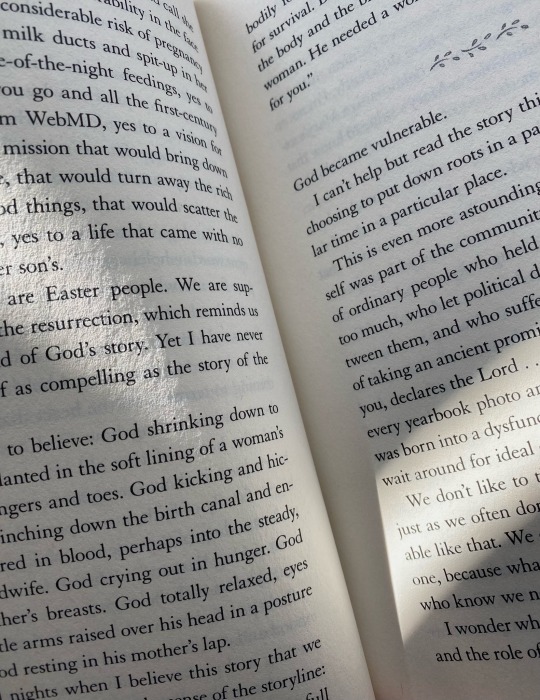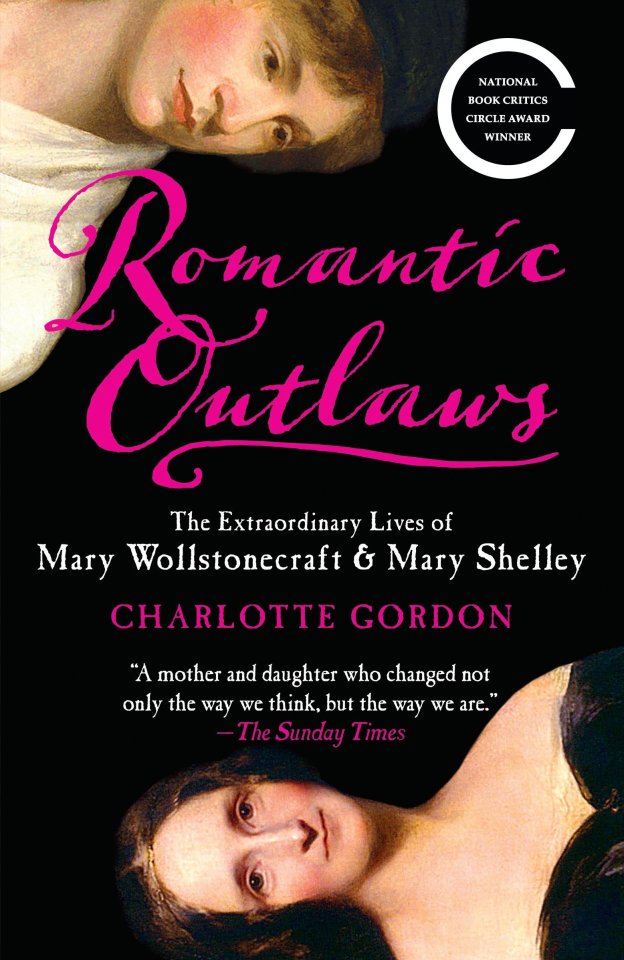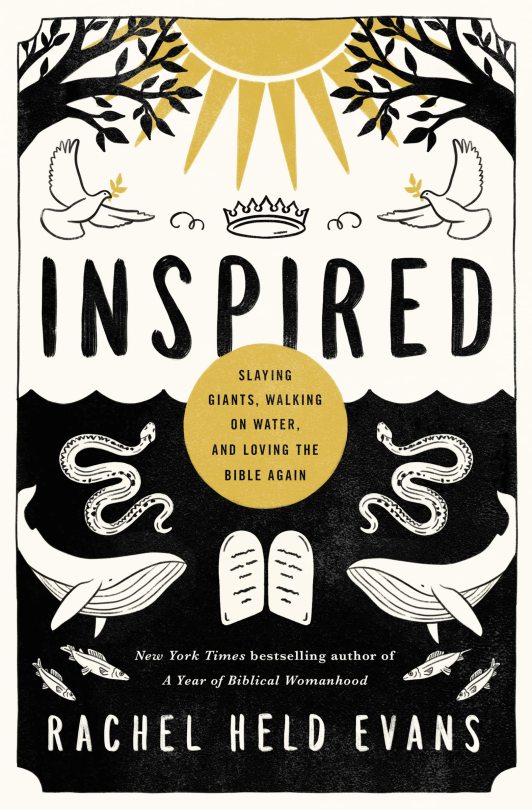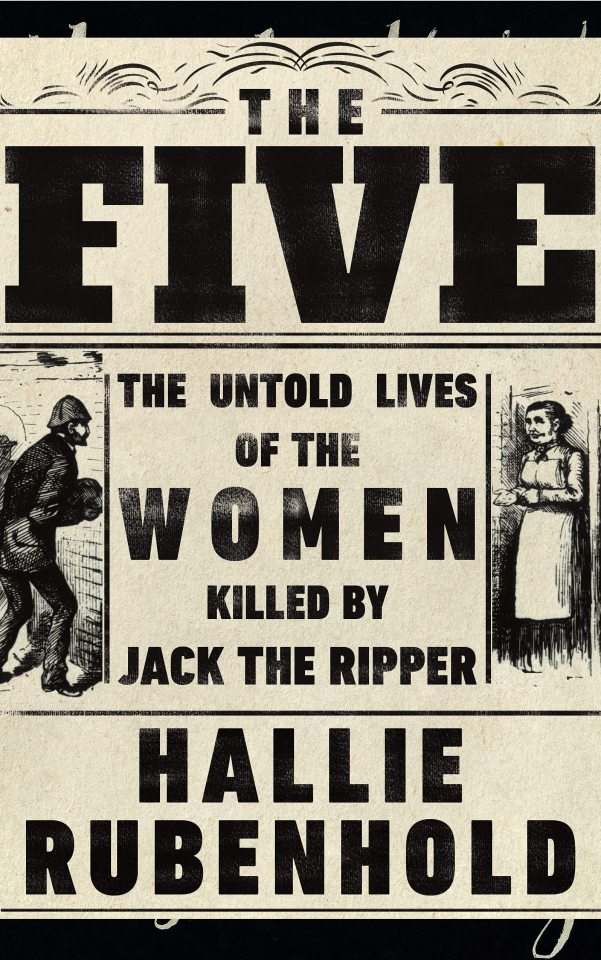#rachel held evans
Text


april 7th, 2024.
tomorrow marks my last ever week of undergraduate classes and it is so so bittersweet. :,)
#bobastudy#my posts#studyblr#academia#aesthetic#dark academia#study with me#light academia#psych major#english major#study aesthetic#coffee#beige#cozy#sunlight#beige aesthetic#rachel held evans#light acadamia aesthetic#undergraduate
279 notes
·
View notes
Text
There's a curious but popular notion circulating around the church these days that says God would never stoop to using ancient genre categories to communicate. Speaking to ancient people using their own language, literary structures, and cosmological assumptions would be beneath God, it is said, for only our modern categories of science and history can convey the truth in any meaningful way.
In addition to once again prioritizing modern, Western (and often uniquely American) concerns, this notion overlooks one of the most central themes of Scripture itself: God stoops. From walking with Adam and Eve through the garden of Eden, to traveling with the liberated Hebrew slaves in a pillar of cloud and fire, to slipping into flesh and eating, laughing, suffering, healing, weeping, and dying among us as part of humanity, the God of scripture stoops and stoops and stoops and stoops. At the heart of the gospel message is the story of a God who stoops to the point of death on a cross.
Dignified or not, believable or not, ours is a God perpetually on bended knee, doing everything it takes to convince stubborn and petulant children that they are seen and loved. It is no more beneath God to speak to us using poetry, proverb, letters, and legend than it is for a mother to read storybooks to her daughter at bedtime. This is who God is. This is what God does.
—Rachel Held Evans, Inspired, p.11-12
#rachel held evans#christianity#biblical interpretation#god#progressive christian#the bible#christian#bible#quotes#episcopalian
618 notes
·
View notes
Text
Wrestling with the Bible's war stories
Spend any solid amount of time with scripture and you'll run into something that perplexes, disturbs, or downright horrifies you. Many of us have walked away from the Bible or from Christianity in general, sometimes temporarily and sometimes permanently, after encountering these stories. So how do we face them, wrestle them, and seek God's presence in (or in spite of) them?
In her book Inspired: Slaying Giants, Walking on Water, and Loving the Bible Again, the late Rachel Held Evans spends a whole chapter on the "war stories" of Joshua, Judges, and the books of Samuel and Kings. She starts with how most teachers in her conservative Christian upbringing shut her down every time she tried to name the horror she felt reading of violence, rape, and ethnic cleansing; I share an excerpt from that part of the chapter over in this post.
That excerpt ends with Evans deciding that she needed to grapple with these stories, or lose her faith entirely.
...But then I ended the excerpt, with the hope that folks would go read all of Inspired for themselves — and I still very much recommend doing so! The whole book is incredibly helpful for relearning how to read scripture in a way that honors its historical context and divine inspiration, and takes seriously how misreadings bring harm to individuals and whole people groups.
But I know not everyone will read the book, for a variety of reasons, and that's okay. So I want to include a long excerpt from the rest of the chapter, where Evans provides cultural context and history that helps us understand why those war stories are in there; and then seeks to find where God's inspiration is among those "human fingerprints."
I know how important it was to Rachel Held Evans that all of us experience healing and liberation, so it is my hope that she'd be okay with me pasting such a huge chunk of the book for reading here. If you find what's in this post meaningful, please do check out the rest of her book! A lot of libraries have it in print, ebook, and/or audiobook form.
[One last comment: the following excerpt focuses on these war stories from the Hebrew scriptures ("Old Testament"), but there are violent and otherwise disturbing stories in the "New Testament" too, from Herod killing babies to all the wild things going on in Revelation. Don't fall for the antisemitic claim that "The Old Testament is violent while the New Testament is all about peace!" All parts of scripture include violent passages, and maintain an overarching theme of justice and love.]
Here's the excerpt showing Rachel's long wrestling with the Bible's war stories, starting with an explanation for why they're in there in the first place:
“By the time many of the Bible’s war stories were written down, several generations had passed, and Israel had evolved from a scrappy band of nomads living in the shadows of Babylon, Egypt, and Assyria to a nation that could hold its own, complete with a monarchy. Scripture embraces that underdog status in order to credit God with Israel’s success and to remind a new generation that “some trust in chariots and some in horses, but we trust in the name of the LORD our God” (Psalm 20:7). The story of David and Goliath, in which a shepherd boy takes down one of those legendary Canaanite giants with just a slingshot and two stones, epitomizes Israel’s self-understanding as a humble people improbably beloved, victorious only by the grace and favor of a God who rescued them from Egypt, walked with them through the desert, brought the walls of Jericho down, and made that shepherd boy a king.
To reinforce the miraculous nature of Israel’s victories, the writers of Joshua and Judges describe forces of hundreds defeating armies of thousands with epic totality. These numbers are likely exaggerated and, in keeping literary conventions of the day, rely more on drama and bravado than the straightforward recitation of fact. Those of us troubled by language about the “extermination” of Canaanite populations may find some comfort in the fact that scholars and archaeologists doubt the early skirmishes of Israel’s history actually resulted in genocide.
It was common for warring tribes in ancient Mesopotamia to refer to decisive victories as “complete annihilation” or “total destruction,” even when their enemies lived to fight another day. (The Moabites, for example, claimed in an extrabiblical text that after their victory in a battle against an Israelite army, the nation of Israel “utterly perished for always,” which obviously isn’t the case. And even in Scripture itself, stories of conflicts with Canaanite tribes persist through the book of Judges and into Israel’s monarchy, which would suggest Joshua’s armies did not in fact wipe them from the face of the earth, at least not in a literal sense.)
Theologian Paul Copan called it “the language of conventional warfare rhetoric,” which “the knowing ancient Near Eastern reader recognized as hyperbole.”
Pastor and author of The Skeletons in God’s Closet, Joshua Ryan Butler, dubbed it “ancient trash talk.”
Even Jericho, which twenty-first-century readers like to imagine as a colorful, bustling city with walls that reached the sky, was in actuality a small, six-acre military outpost, unlikely to support many civilians but, as was common, included a prostitute and her family. Most of the “cities” described in the book of Joshua were likely the same. So, like every culture before and after, Israel told its war stories with flourish, using the language and literary conventions that best advanced the agendas of storytellers.
As Peter Enns explained, for the biblical writers, “Writing about the past was never simply about understanding the past for its own sake, but about shaping, molding and creating the past to speak to the present.”
“The Bible looks the way it does,” he concluded, “because God lets his children tell the story.”
You see the children’s fingerprints all over the pages of Scripture, from its origin stories to its deliverance narratives to its tales of land, war, and monarchy.
For example, as the Bible moves from conquest to settlement, we encounter two markedly different accounts of the lives of Kings Saul, David, and Solomon and the friends and enemies who shaped their reigns. The first appears in 1 and 2 Samuel and 1 and 2 Kings. These books include all the unflattering details of kingdom politics, including the account of how King David had a man killed so he could take the man’s wife, Bathsheba, for himself.
On the other hand, 1 and 2 Chronicles omit the story of David and Bathsheba altogether, along with much of the unseemly violence and drama around the transition of power between David and Solomon.
This is because Samuel and Kings were likely written during the Babylonian exile, when the people of Israel were struggling to understand what they had done wrong for God to allow their enemies to overtake them, and 1 and 2 Chronicles were composed much later, after the Jews had returned to the land, eager to pick up the pieces.
While the authors of Samuel and Kings viewed the monarchy as a morality tale to help them understand their present circumstances, the authors of the Chronicles recalled the monarchy with nostalgia, a reminder of their connection to God’s anointed as they sought healing and unity. As a result, you get two noticeably different takes on the very same historic events.
In other words, the authors of Scripture, like the authors of any other work (including this one!), wrote with agendas. They wrote for a specific audience from a specific religious, social, and political context, and thus made creative decisions based on that audience and context.
Of course, this raises some important questions, like: Can war stories be inspired? Can political propaganda be God-breathed? To what degree did the Spirit guide the preservation of these narratives, and is there something sacred to be uncovered beneath all these human fingerprints?
I don’t know the answers to all these questions, but I do know a few things.
The first is that not every character in these violent stories stuck with the script. After Jephthah sacrificed his daughter as a burnt offering in exchange for God’s aid in battle, the young women of Israel engaged in a public act of grief marking the injustice. The text reports, “From this comes the Israelite tradition that each year the young women of Israel go out for four days to commemorate the daughter of Jephthah” (Judges 11:39–40).
While the men moved on to fight another battle, the women stopped to acknowledge that something terrible had happened here, and with what little social and political power they had, they protested—every year for four days. They refused to let the nation forget what it had done in God’s name.
In another story, a woman named Rizpah, one of King Saul’s concubines, suffered the full force of the monarchy’s cruelty when King David agreed to hand over two of her sons to be hanged by the Gibeonites in an effort to settle a long, bloody dispute between the factions believed to be the cause of widespread famine across the land. A sort of biblical Antigone, Rizpah guarded her sons’ bodies from birds and wild beasts for weeks, until at last the rain came and they could be buried. Word of her tragic stand spread across the kingdom and inspired David to pause to grieve the violence his house had wrought (2 Samuel 21).” ...
The point is, if you pay attention to the women, a more complex history of Israel’s conquests emerges. Their stories invite the reader to consider the human cost of violence and patriarchy, and in that sense prove instructive to all who wish to work for a better world. ...
It’s not always clear what we are meant to learn from the Bible’s most troubling stories, but if we simply look away, we learn nothing.
In one of the most moving spiritual exercises of my adult faith, an artist friend and I created a liturgy of lament honoring the victims of the texts of terror. On a chilly December evening, we sat around the coffee table in my living room and lit candles in memory of Hagar, Jephthah’s daughter, the concubine from Judges 19, and Tamar, the daughter of King David who was raped by her half brother. We read their stories, along with poetry and reflections composed by modern-day women who have survived gender-based violence. ...
If the Bible’s texts of terror compel us to face with fresh horror and resolve the ongoing oppression and exploitation of women, then perhaps these stories do not trouble us in vain. Perhaps we can use them for some good.
The second thing I know is that we are not as different from the ancient Israelites as we would like to believe.
“It was a violent and tribal culture,” people like to say of ancient Israel to explain away its actions in Canaan. But, as Joshua Ryan Butler astutely observed, when it comes to civilian casualties, “we tend to hold the ancients to a much higher standard than we hold ourselves.” In the time it took me to write this chapter, nearly one thousand civilians were killed in airstrikes in Iraq and Syria, many of them women and children. The atomic bombs dropped on Hiroshima and Nagasaki took hundreds of thousands of lives in World War II, and far more civilians died in the Korean War and Vietnam War than American soldiers. Even though America is one of the wealthiest countries in the world, it takes in less than half of 1 percent of the world’s refugees, and drone warfare has left many thousands of families across the Middle East terrorized.
This is not to excuse Israel’s violence, because modern-day violence is also bad, nor is it to trivialize debates over just war theory and US involvement in various historical conflicts, which are complex issues far beyond the scope of this book. Rather, it ought to challenge us to engage the Bible’s war stories with a bit more humility and introspection, willing to channel some of our horror over atrocities past into questioning elements of the war machines that still roll on today.
Finally, the last thing I know is this: If the God of the Bible is true, and if God became flesh and blood in the person of Jesus Christ, and if Jesus Christ is—as theologian Greg Boyd put it—“the revelation that culminates and supersedes all others,” then God would rather die by violence than commit it.
The cross makes this plain. On the cross, Christ not only bore the brunt of human cruelty and bloodlust and fear, he remained faithful to the nonviolence he taught and modeled throughout his ministry. Boyd called it “the Crucifixion of the Warrior God,” and in a two-volume work by that name asserted that “on the cross, the diabolic violent warrior god we have all-too-frequently pledged allegiance to has been forever repudiated.” On the cross, Jesus chose to align himself with victims of suffering rather than the inflictors of it.
At the heart of the doctrine of the incarnation is the stunning claim that Jesus is what God is like. “No one has ever seen God,” declared John in his gospel, “but the one and only Son, who is himself God and is in closest relationship with the Father, has made him known” (John 1:18, emphasis added). ...So to whatever extent God owes us an explanation for the Bible’s war stories, Jesus is that explanation. And Christ the King won his kingdom without war.
Jesus turned the war story on its head. Instead of being born to nobility, he was born in a manger, to an oppressed people in occupied territory. Instead of charging into Jerusalem on a warhorse, he arrived on a lumbering donkey. Instead of rallying troops for battle, he washed his disciples’ feet. According to the apostle Paul, these are the tales followers of Jesus should be telling—with our words, with our art, and with our lives.
Of course, this still leaves us to grapple with the competing biblical portraits of God as the instigator of violence and God as the repudiator of violence.
Boyd argued that God serves as a sort of “heavenly missionary” who temporarily accommodates the brutal practices and beliefs of various cultures without condoning them in order to gradually influence God’s people toward justice. Insofar as any divine portrait reflects a character at odds with the cross, he said, it must be considered accommodation. It’s an interesting theory, though I confess I’m only halfway through Boyd’s 1,492 pages, so I’ve yet to fully consider it. (I know I can’t read my way out of this dilemma, but that won’t keep me from trying.)
The truth is, I’ve yet to find an explanation for the Bible’s war stories that I find completely satisfying. If we view this through Occam’s razor and choose the simplest solution to the problem, we might conclude that the ancient Israelites invented a deity to justify their conquests and keep their people in line. As such, then, the Bible isn’t a holy book with human fingerprints; it’s an entirely human construction, responsible for more vice than virtue.
There are days when that’s what I believe, days when I mumble through the hymns and creeds at church because I’m not convinced they say anything true. And then there are days when the Bible pulls me back with a numinous force I can only regard as divine, days when Hagar and Deborah and Rahab reach out from the page, grab me by the face, and say, “Pay attention. This is for you.”
I’m in no rush to patch up these questions. God save me from the day when stories of violence, rape, and ethnic cleansing inspire within me anything other than revulsion. I don’t want to become a person who is unbothered by these texts, and if Jesus is who he says he is, then I don’t think he wants me to be either.
There are parts of the Bible that inspire, parts that perplex, and parts that leave you with an open wound. I’m still wrestling, and like Jacob, I will wrestle until I am blessed. God hasn’t let go of me yet.
War is a dreadful and storied part of the human experience, and Scripture captures many shades of it—from the chest-thumping of the victors to the anguished cries of victims. There is ammunition there for those seeking religious justification for violence, and solidarity for all the mothers like Rizpah who just want an end to it.
For those of us who prefer to keep the realities of war at a safe, sanitized distance, and who enjoy the luxury of that choice, the Bible’s war stories force a confrontation with the darkness.
Maybe that’s not such a bad thing.
#joshua#biblical interpretation#texts of terror#rachel held evans#inspired#wrestling god#reading and studying the bible#bible tag#long post#quote tag
46 notes
·
View notes
Quote
God needed women for survival. Before Jesus fed us with the bread and the wine, the body and the blood, Jesus himself needed to be fed, by a woman. He needed a mother to say: “This is my body, given for you.”
Rachel Held Evans
427 notes
·
View notes
Text

43 notes
·
View notes
Text





The best nonfiction books I've read so far this year
Romantic Outlaws: The Extraordinary Lives of Mary Wollstonecraft and Mary Shelley by Charlotte Gordon
Direct Action: Protest and the Reinvention of American Radicalism by L.A. Kauffman
Shakespeare: The World as Stage by Bill Bryson
Inspired: Slaying Giants, Walking on Water, and Loving the Bible Again by Rachel Held Evans
The Five: The Untold Lives of the Women Killed by Jack the Ripper by Hallie Rubenhold
#book recs#booklr#bookblr#nonfiction#mary shelley#mary wollstonecraft#direct action#shakespeare#bill bryson#rachel held evans#hallie rubenhold
48 notes
·
View notes
Text
The truth is, you can bend Scripture to say just about anything you want it to say. You can bend it until it breaks. For those who count the Bible as sacred, interpretation is not a matter of whether to pick and choose, but how to pick and choose. We’re all selective. We all wrestle with how to interpret and apply the Bible to our lives. We all go to the text looking for something, and we all have a tendency to find it.
So the question we have to ask ourselves is this: are we reading with the prejudice of love, with Christ as our model, or are we reading with the prejudices of judgment and power, self-interest and greed? Are we seeking to enslave or liberate, burden or set free?
If you are looking for Bible verses with which to support slavery, you will find them. If you are looking for verses with which to abolish slavery, you will find them. If you are looking for verses with which to oppress women, you will find them. If you are looking for verses with which to honor and celebrate women, you will find them. If you are looking for reasons to wage war, there are plenty. If you are looking for reasons to promote peace, there are plenty more. If you are looking for an outdated and irrelevant ancient text, that’s exactly what you will see. If you are looking for truth, that’s exactly what you will find.
This is why there are times when the most instructive question to bring to the text is not, What does this say? but, What am I looking for? I suspect Jesus knew this when he said, “Ask and it will be given to you; seek and you will find; knock and the door will be opened to you” (Matthew 7:7). If you want to do violence in this world, you will always find the weapons. If you want to heal, you will always find the balm.
With Scripture, we’ve been entrusted with some of the most powerful stories ever told. How we harness that power, whether for good or evil, oppression or liberation, changes everything.
Rachel Held Evans
Inspired
#quote#quotes#rachel held evans#inspired#book quote#scripture#the bible#christianity#religion#inspired: slaying giants; walking on water; and loving the bible again
3 notes
·
View notes
Quote
The 150-plus gallons of wine at Cana point to a generous God, a God who never runs out of holy things. This is the God who, much to the chagrin of Jonah, saved the rebellious city of Nineveh, the God who turned five loaves of bread and a couple of fish into a lunch to feed five thousand with baskets of leftovers to spare. This God is like a vineyard manager who pays a full day’s wage for just one hour of work, or like a shepherd who leaves his flock in search of a single lamb, or like a father who welcomes his prodigal son home with a robe, a ring, and a feast.
Rachel Held Evans, Searching for Sunday: Loving, Leaving, and Finding the Church
17 notes
·
View notes
Text
the fact that we will never read a new Rachel Held Evans book still fills me with indescribable grief and it's been years. Her voice was such a beautiful one amongst all the mess of prog christian twitter, and I know I'm far from the only one that misses her despite not knowing her.
10 notes
·
View notes
Text
I know it’s been years but I still can’t believe Rachel Held Evans is dead :/
6 notes
·
View notes
Text
The Bible is resistance literature.
In the case of the mutant creatures of Daniel and Revelation, [biblical beasts] represent the evils of oppressive empires.
It’s easy for modern-day readers to forget that the Bible was written by oppressed religious minorities living under the heels of powerful nation-states known for their extravagant wealth and violence. For the authors of the Old Testament, it was the Egyptian, Assyrian, Babylonian, Greek, and Persian Empires. For the authors of the New Testament, it was, of course, the massive Roman Empire. These various superpowers, which inflicted centuries of suffering upon the Jews and other conquered populations, became collectively known among the people of God as Babylon.
One of the most important questions facing the people who gave us the Bible was: How do we resist Babylon, both as an exterior force that opposes the ways of God and an interior pull that tempts us with imitation and assimilation? They answered with volumes of stories, poems, prophecies, and admonitions grappling with their identity as an exiled people, their anger at the forces that scattered and oppressed them, God’s role in their exile and deliverance, and the ultimate hope that one day “Babylon, the jewel of kingdoms, the pride and glory of the Babylonians, will be overthrown by God” (Isaiah 13:19).
It is in this sense that much of Scripture qualifies as resistance literature. It defies the empire by subverting the notion that history will be written by the wealthy, powerful, and cruel, insisting instead that the God of the oppressed will have the final word.
—Rachel Held Evans, Inspired: Slaying Giants, Walking on Water, and Loving the Bible Again, p. 118
#rachel held evans#episcopalian#christianity#christian#progressive christianity#progressive christian#lgbtq christian#lgbt christian#queer christian#leftist#bible study#biblical interpretation#the bible#bible#scripture#god
117 notes
·
View notes
Text
“This word for church, ekklesia, was used at the time of Jesus to refer to the “calling out” of citizens for a civic meeting or for battle, and is employed in one form or another in both the Old and New Testaments to refer to the people of God, assembled together. So church is, essentially, a gathering of kingdom citizens, called out--from their individuality, from their sins, from their old ways of doing things, from the world’s way of doing things--into participation in this new kingdom and community with one another.
I’m not exactly sure how all this works, but I think, ultimately, it means I can’t be a Christian on my own. Like it or not, following Jesus is a group activity, something we’re supposed to do together. We might not always do it within the walls of church or even in an organized religion, but if we are to go about making disciples, confessing our sins, breaking bread, paying attention, and preaching the Word, we’re going to need one another. We’re going to need each other’s help.
The church is not the same as the kingdom. As George Eldon Ladd explains, “The Kingdom is God’s reign and the realm in which the blessings of this reign are experiences; the church is the fellowship of those who have experienced God’s reign and entered into the enjoyment of its blessings.” The purpose of the church, and of the sacraments, is to give the world a glimpse of the kingdom, to point in its direction. When we put a kingdom-spin on ordinary things--water, wine, leadership, marriage, friendship, feasting, sickness, forgiveness--we see that they can be holy, they can point us to something greater than ourselves, a fantastic mystery that brings meaning to everything. We make something sacramental when we make it like the kingdom. Marriage is sacramental when it is characterized by mutual love and submission. A meal is sacramental when the rich and poor, powerful, and marginalized, sinners and saints share equal status around the table. A local church is sacramental when it is a place where the last are first and the first are last and where those who hunger and thirst and fed. And the church universal is sacramental when it knows no geographic boundaries, no political parties, no single language or culture, and when it advances not through power and might, but through acts of love, joy, and peace and missions of mercy, kindness, humility. [...]
And even still, the kingdom remains a mystery just beyond our grasp. It is here, and not yet, present and still to come. Consummation, whatever that means, awaits us. Until then, all we have are metaphors. All we have are almosts and not quites and wayside shrines. All we have are imperfect people in an imperfect world doing their best to produce outward signs of inward grace and stumbling all along the way.
All we have is this church--this lousy, screwed-up, glorious church--which, by God’s grace, is enough.”
--Rachel Held Evans, Searching for Sunday
#did not realize till i typed all this up just how much this woman liked COMMAS#christianity#rachel held evans#op
0 notes
Text

#church#church quotes#quotes#inspirational#christian#religious#christian quotes#I think this is christian#rachel held evans
1 note
·
View note
Text
Reading Inspired by Rachel Held Evans is bittersweet. It’s excellently written, thoughtful, and creative. All these qualities make it painful to read knowing that Evans died (and died so young) and that her light is missing from the world.
0 notes
